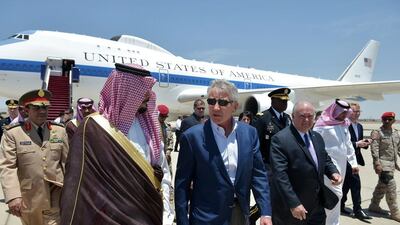New York // The US defence secretary will meet with his GCC counterparts in Jeddah on Wednesday to push for greater regional security coordination before Washington-led negotiations with Tehran enter their final stages this summer.
Chuck Hagel met the Saudi deputy defence minister, Salman bin Sultan, after landing in Jeddah on Tuesday and thanked Saudi leaders for hosting the first US-GCC Strategic Defence Dialogue since 2008, according to Pentagon spokesman Rear Admiral John Kirby.
They discussed “regional threats and challenges including Iran and Syria and the importance of maintaining close cooperation on these and other issues in the region”, Adm Kirby said.
The US administration has been pushing for the GCC countries to cooperate more closely and integrate their missile defences in order to demonstrate to Iran that despite its plans for a strategic shift away from the Middle East to East Asia, Washington is committed to the region’s security.
The common challenges faced in the region cannot be solved without the partnership of the GCC nations, and the summit reflects the US commitment to regional approaches, a defence official told the Pentagon’s news service.
The US president Barack Obama has cleared the way for US military sales to the GCC as a bloc, rather than just to each country bilaterally, which is also meant to reassure Gulf countries angered by Washington’s negotiations with Tehran and the stated US desire to “pivot” its foreign policy focus to East Asia.
But GCC countries prefer to engage with the US bilaterally, in line with their individual interests, which do not necessarily align. The unprecedented rift in the GCC between Qatar on the one hand and Saudi Arabia and the UAE on the other over Doha’s support for the Muslim Brotherhood make the goal of integration more remote.
The Saudi press reported that Qatar’s defence minster would attend Wednesday’s talks, but Qatar’s military attache in Washington had not confirmed this by the time of publication.
Wednesday’s talks will focus on building closer coordination between the US and GCC regarding their approaches to the war in Syria as well as how to help Egypt as it struggles with political transition and economic reform.
Negotiations with Iran over its disputed nuclear programme have also raised fears that the US was not thinking of its traditional allies’ security and that Tehran would get a free hand to pursue destabilising regional policies if a deal was struck.
The US has worked to dispel these fears, culminating in Mr Obama’s talks with Saudi King Abdullah last month near Riyadh. Mr Hagel will bolster the message of reassurance about Washington’s intentions and also address differences over stronger multilateral cooperation at the meeting on Wednesday.
Most of the countries have engaged cautiously with Tehran, and the Iranian foreign minister, Mohammad Javad Zarif, visited the UAE, Kuwait, Qatar and Oman to ease fears following an interim nuclear agreement with world powers that loosened sanctions on Iran.
Ties between Riyadh and its arch rival Tehran have remained strained, but recent signs point toward a softening. On Tuesday, the Saudi foreign minister, Prince Saud Al Faisal, invited Mr Zarif to visit Riyadh.
“This intention to visit has not become a fact ... but any time he sees fit to come, we are willing to receive [Zarif],” Prince Faisal said. “We’ll negotiate with them [Iran], we’ll talk with them, and our hope is that Iran becomes part of the effort to make the region as safe and as prosperous as possible and not become part of the problem.”
Saudi Arabia supports rebels fighting the Iranian-backed regime in Syria, and claims that Iran meddles in Gulf affairs. But Riyadh faces mounting concerns of terrorist blowback from the Syrian war. Saudi authorities recently announced they had dismantled a local cell of the Islamic State of Iraq and the Levant (ISIL), a breakaway faction of Al Qaeda fighting in Syria.
The Saudi invitation does not mean “that everything is over in terms of the issues they have with each other, but it’s a big step in the direction of reconciliation”, Ghanem Nuseibeh, founder of Cornerstone Global Associates, which advises clients on risk in the Middle East, told Bloomberg.
“They know that they need to work together to ensure that their interests don’t go directly against each other.”
tkhan@thenational.ae

